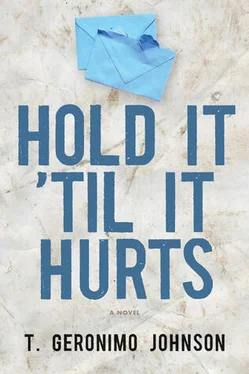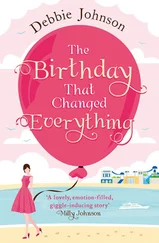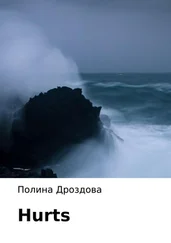The Fernbank lecturer, wearing socks with sandals and smelling of patchouli, compared the Big Bang to conception, calling it, “Another explosive genesis, but driven by enzymes. A flash of light is emitted at conception, a burst that is far too bright to be explained by chemistry. Boom! There we are. And so our body is created in a big bang, like the universe. Likewise, it starts to cool and contract in old age.” He lowered his voice, as if delivering a pickup line. “In this vast universe, there are solar systems, and in these solar systems there is us, and in us, there are additional solar systems. We are each interconnected beings of light.” Achilles noticed, not for the first time, how Ines perked up when she was intellectually stimulated, as if aroused. His anxiety that he would never be an intellectual was cooled by the fact that he felt equally moved, being in that moment entranced by the possibility that all was as it was meant to be.
At the same time, the Fernbank lecture had left him spooked, much in the same way it chilled him to hear Ines, stoned, hold forth on water and earth as living things. If the world were alive, it would be a mirror reflecting him at every turn, and he simply couldn’t abide that. He didn’t like the thought of a living being that large and always in motion, and breathing, and watching, for surely it would see him and know what he worked so hard not to think about, surely it would harrow his secrets and kindle his fears. If the world were alive, wouldn’t that be like a parent who knew your every move? Wouldn’t thoughts be weapons? Wouldn’t that make karma real? Wouldn’t there be danger in his joke, “Everyone wants what they deserve. Me, I’m hoping not to get it.”
In retrospect, it had been a good time. Like she had with New Orleans, Ines breathed life into Atlanta. During that trip, they’d visited the Coca-Cola Museum, eaten prime rib at Bones, strolled Phipps Plaza’s marble halls. Now he was stepping over beer bottles and dog shit. Armed with Wexler’s map, Achilles noted the new street names, which definitely didn’t match the neighborhood. Medgar Evers was surrounded by Carnation Avenue, Gladiola Street, and Peace Lily Way. Achilles corrected the map as he circled the block. If a house appeared abandoned, he went inside. If not, he knocked. It took over ninety minutes to do all thirty-five houses on the first block. There were sixty-five more blocks, not to mention the old paper plant and the abandoned cotton mill. He wouldn’t be even halfway finished before Sunday, when he had to leave. He battled his discouragement by trying to stick to the plan and treat it like a road march — one foot after the other, orderly, insistent. But he couldn’t shake the feeling that when he was on one side of the block, Troy was on the opposite side, that they were like the blades of a propeller, and he soon found himself backtracking and making figure eights via the grassy alleys, like a gambler who thinks that one more time around and the wheel will pay.
Alleys fed even narrower side streets that poured into broad thoroughfares like Auburn Avenue, which was once the African American Main Street, according to Wexler. The decline appeared irreversible, like New Orleans’s own Tremé District, which Ines had explained was the oldest black neighborhood in America (and St. Augustine the oldest black parish). The Fourth Ward felt different because at least commuters passed through this neighborhood, whereas in the Tremé, you either lived there or you were lost. In both cities, old men spoke and young men stared. But Atlanta had more black history on display, the neighborhood dotted with plaques memorializing bygone glory. One minute he was in a Section Eight complex, the next he was on a path identified as Freedom Walk. For a time it seemed the only businesses were pawnshops, churches, and funeral homes. Then came King’s tomb and torch. Achilles detoured from his path, venturing into the paved courtyard surrounding the tomb. A group of schoolchildren held hands, heads bowed before the eternal flame. Catty-corner from the MLK center, a row of burned-out homes, and across the street a statue of Gandhi. A few blocks later he was facing a six-foot-tall cast of John Wesley Dobbs’s head. The plaque read: “Give us the 3 Bs — the buck, the ballot, and the book.” Behind the sculpture, winos slept in the shadow of a replica of a slave castle wall. As he passed the winos, one spoke: “What’s up, young blood?”
The tone and timber of the man’s voice reminded Achilles of Bud and Father Levreau, and the blaxploitation movies he had recently discovered and enjoyed but Ines detested: Dolomite, Shaft, Black Belt Jones, Truck Turner. Pimps, pushers, prostitutes. “It’s vaudeville,” declared Ines, “blacks in blackface.” But Achilles saw black men leading a revolution, cleaning up their neighborhoods, meeting the government on their own terms. The fabled Spook Who Sat by the Door, of which he had only heard, Gordon’s War, Coffy (Grier had serious high-beams): where were they now? Afros and picks with fists, fly suits, and high fives; the seventies were a golden age of brotherhood. The men in the shelters often talked about it, a time when everyone was a brother or sister, a time when there were young bloods because they were all of the same blood . He felt a heightened sense of fraternity as he answered, “I’m fine, old-timer. How are you?”
“Good, brother, but I sure could use a quarter, a dime, anything to help a brother get something to eat.” His eyes were red, but his hair was thick and wooly. He was plum-cheeked and thick-ribbed, his body round, not chiseled and angular like those on the crunch diet. He could work. Achilles handed him some change, a bargain for such a precious lesson, or a refresher course. You couldn’t talk to some people without being asked for money.
What would Ines say? Achilles asked himself as he entered an abandoned house and found himself staring down at two squatters immune to the flashlight shining in their eyes, splayed out as if they had fallen from a great height onto the soiled bedspring, a raft in a sea of food wrappers and glossy jack mags. Brother, do you think you can hide from your true nature? Brother, why are you killing yourself? Achilles told himself, Self, they’re not weak, they’re just hurt. He couldn’t conjure her compassion.
These men before him were self-destructive, meaning weak. Through the ratty aluminum foil covering the window, a few dusty blades of light stabbed the darkness. At the foot of the bed were bits of fur mixed with balls of puffy mattress stuffing. Beside it, a tub turned toilet, attended by flies. On the floor in the corner, a third man, curled into a ball, with a bundle of newspaper for a pillow, hugged a Krazy Kreme donut box to his chest, a column of ants trekking back and forth across his arm and circling the sugar ring around his mouth. Feeling like a vampire hunter, Achilles ripped a large strip of foil off the window. The man on the floor beat at the ants.
“Hands up! Heads down!” Achilles yelled in Arabic and Pashto, as a joke. But as he said it, his right hand reached for his sling and his heart started racing.
Two of the guys retreated to the corner, hiding their faces like bad dogs. One man in a black POW-MIA T-shirt rolled off the bedspring and onto the floor, turning clumsily, the exposed steel toes of his unlaced boots knocking the floorboards until he reached the shadows. Achilles hefted the flashlight like a baton, ready to strike. Unarmed is disarmed! It’s like sticking your ass up and yelling “chowtime” in San Fran!
The man in the POW-MIA shirt sat up, one hand raised to shield his eyes from the light. His voice hopeful, he asked, “Lionel?”
Читать дальше












